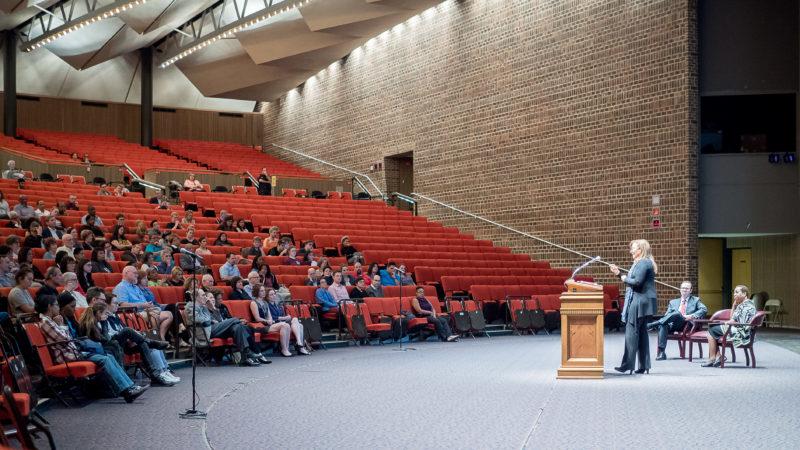Michele Norris, former co-host of National Public Radio’s “All Things Considered,” spoke to an audience of approximately 300 in Laurie Auditorium on Tuesday about the importance of engaging in candid conversations about race in America.
Norris’ visit is one of several events in the “Dare to Listen” campaign co-sponsored by Texas Public Radio and the San Antonio Area Foundation. Danny Anderson, president of Trinity University, emphasized the importance of these conversations.
“We must lean into the issues rather than pull back from them,” Anderson said. “Critical listening is a central ingredient for success.”
In 2010, Norris developed The Race Card Project, a Peabody Award-winning program that encourages people to submit six-word sentences about their experiences with race. But during her speech, Norris explained why she originally shied from covering race early in her journalistic career.
“For a long time, as a journalist, I did not want to be the reporter on the race beat,” Norris said. “I was afraid that if I started to cover issues of race assiduously, that was all I would do.”
Norris notes that in the wake of Obama’s election, a certain word entered public discourse: “post-racial.” Norris asked for audience reactions to the term: “BS,” “Progress,” and “We’re not there” were among the crowd’s responses.
“Post-racial suggested that we were moving into a space where we would perhaps not need to talk about race,” Norris said. She attributes this shift in the national conversation as her inspiration for beginning The Race Card Project.
“Maybe I could tell a story and get people to share a story,” Norris says. Norris references Zora Neale Hurston, anthropologist and novelist, as inspiration for this model of conversation.
“I decided to play the race card,” Norris said. “I hate the term, ‘the race card,’ I’ve never liked that term. It usually is uttered by someone who is uncomfortable by something someone is saying. It’s an elegant way of saying, ‘Please shut up.’ [So] I wanted to create something that would actually stoke conversation.”
“Each of you has the power to make a difference in your own sphere,” Norris said, “[by] making a space for other people to share their story, making someone uncomfortable, and figuring out how to listen to someone.”
Following her lecture, Norris answered questions from the audience. Audience members shared their six-word statements and inquired about reparations, the 2016 documentary “I Am Not Your Negro,” white nationalism, the effect of Obama’s legacy on race relations in the U.S. and the proper responses to hate speech.
Norris also read excerpts from her 2010 autobiographical book, “The Grace of Silence: A Family Memoir.” She explained that her father taught her the importance of loving one’s country, even when doing so is difficult.
“He was extremely patriotic,” Norris said. “Hold onto your idea of the America you want to see, and fight for it.”
Before the lecture, Norris met with the Black Student Union to discuss The Race Project; using the search function of the project’s website — theraceproject.com — members scanned the database of submissions based on particular terms, for instance “bigot” and “hair.”
Additionally, the Black Student Union led a discussion with Stacy Davidson, director of academic support, on Wednesday following the lecture. Students discussed ways to begin conversations about race and racism, the values that silence in the face of such discussions can express and the reasons people might be hesitant to discuss race and ethnic identity.
Alex Holler, senior environmental policy major, had a positive experience at the discussion.
“We talked about what we might do to help people prepare for these conversations,” Holler said. “It’s really hard to do that when the people who attend the lectures are the same people.”
“This is a problem I care about a lot,” Holler said. “How do we reach out to people who haven’t had these experiences or heard these experiences before? How do we get them into it without making them feel intimidated by the whole prospect of talking about race? The idea is to be able to introduce that slight discomfort without driving them away or scaring them away first.”
The next “Dare to Listen” event will be held Feb. 20, from 8 to 8:50 a.m., at UTSA’s main campus. Texas Public Radio’s president and CEO, Joyce Slocum, will present the initiative to the audience; the event’s location is to be announced. Those interested can visit idaretolisten.org for more information.







